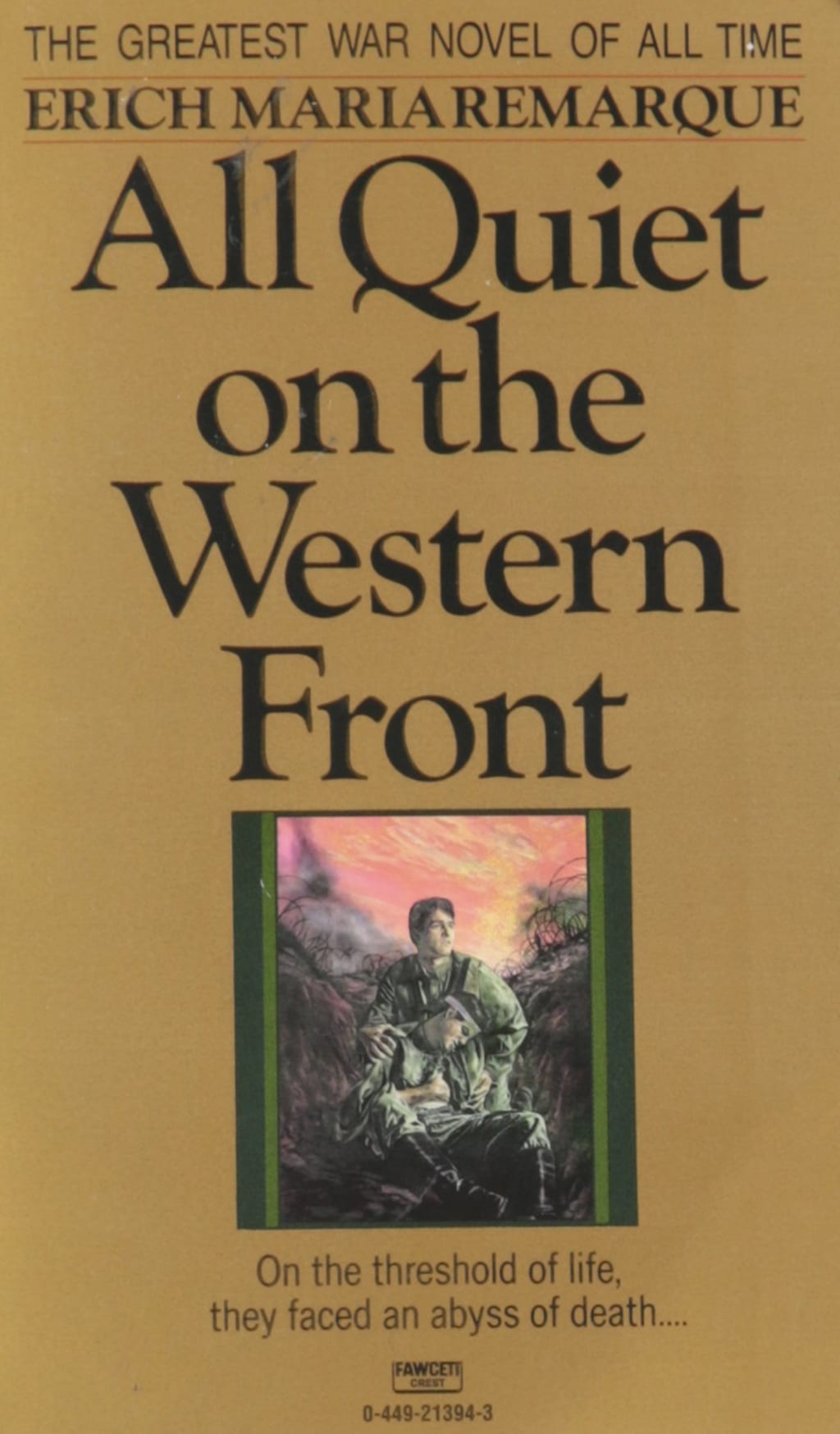'All Quiet on the Western Front'—Food for Sustenance
Considered the Greatest War Novel of All Time

All Quiet on the Western Front, by Erich Maria Remarque, is considered the greatest war novel of all time. The perspective of the story takes place from a soldier on the enemy side of World War I. Readers get to walk through the life of a young soldier, Paul, on his perspective of the events of the war. Paul and many other soldiers go through the difficulties of war as they face many near-death experiences. This book really shows how war can eat away someone's sanity through the traumatizing effects when watching your friends die and killing a person who you don’t even know. This affects Paul the most because he doesn’t know how to put his feelings into words. As the events go by in the story, rather than staying at home with his family, Paul would rather be in the war fighting so he can ignore his feelings and thoughts. This section in the book makes one wonder if all the soldiers felt this way. The soldiers don’t have much of anything in the war to make them happy, but a quote which stands out from the story is, “Now they have the two things a soldier needs for contentment, good food and good rest” (138). A soldier never get much food and it’s amazing the soldiers ever get to eat. Food for sustenance is a very important theme in the story of All Quiet on the Western Front and it becomes a major aspect of the soldier's lives while they fight.
The first point where food for sustenance comes up is when food has to be rationed by the soldiers during one of the first few chapters of the story. Food is scarce during the war and whenever there is a chance to eat, one has to be strong and eat little of what they have and save it. When Paul sees new recruits enter each day they all have the same negative reaction to what they get. What they get for food isn’t a complete meal, because all they get are turnips and various vegetables. They need to treat the vegetables as a meal because they won’t be getting a full meal at any point in the next year during the war. This is a quote Kat says in chapter three, “Give ‘em some grub and all the same pay and the war would be over and done in a day” (41). Kat is basically telling the new recruits that they’re going to get the same thing every day out on the front and should never waste. The soldiers wasted their bread by giving it to the rats to get them to leave. It turned out it wasn’t a good idea because the soldiers lost bread and eventually didn’t have anymore. This was a huge regret for the soldiers because they could have prevented the rats from coming in a different way. A big moment in the story where food for sustenance comes in play is in chapter eight where the men have to rummage through garbage cans to find something to eat. They’re so desperate to eat that they have to trade off their own personal items to eat. If a new recruit is going into war thinking that their mealtimes are going to be like what they got at home, they have to think again and find ways to learn how to ration food or learn how to like foods they never liked before, because they’re going to find a lot of things they dislike. If one could try, such as Kat would do, one way to maximize your rations is to take all you can get and store it in a safe place where nobody can find it. Doing this, you’ll have the amount of food you need so you are never desperate throughout the war.
If a soldier becomes desperate for food, sustenance comes in and they need to hunt. In chapter five, Paul picks a goose and kills it. “I make a jump. I catch hold of one and the next instant the second. Like a madman I bash their heads against the wall to stun them...” Paul has no intentions to kill the good humanely because he is starving. This is the only way to survive with food during the war. If there isn’t any food on the front they must not give killing an animal a second thought because at that moment it’s their only way to survive the day. While eating their prey, all together, none of the men are selfish. They eat what they’re given and make sure to save some for comrades who had to miss out on the feast. This is a really generous move because the soldiers don’t want to feel guilty for not sharing with their friends who are starving. Food for sustenance creates a strong bond between Paul and the soldiers during a point in chapter 10 where the men are sent to guard an abandoned village where they collect all sorts of food supplies. While roasting two suckling pigs Paul quotes, “The suckling pigs are roasted whole. We all stand around them as before an altar” (234). For weeks on end the soldiers cook and bond with each other. In an ironic moment during the chapter, an air raid happens and instead of protecting themselves they all do whatever they can to protect their food so it will survive. The soldiers worship the food they rarely get as if they were a person or someone more important, such as God. Each shield the food from bullets that could easily kill them, rather the food to survive than themselves. This is the biggest moment where food for sustenance is played out in the novel because the food is treated as a person to the soldiers, almost like an important friend. Food is the only chance for survival and if food gets destroyed during the battles the soldiers will look at it as if it’s a close friend who has just been killed. This is the most important section of the whole book that tells the reader a lot about food for sustenance. The soldiers enjoy their time together and look at one another as if they’ve known each other their whole lives. This sections really brings out the soldiers brotherhood with each other because it makes Paul slightly forget about who his real family is.
Paul has gone through a series of mental changes because of the war. Paul is sent home to have a break from the war, a time in which he doesn’t enjoy because it messes up his mind because of food made with love that his family puts out for him. Paul treats the nice, hot cooked meal on the table as if it’s nothing. It’s something many soldiers would beg to have all during the battles, but Paul can’t bear to even look at it. The difference between the food he eats during the war is that it has no emotion in it and barely any flavor. His mother has cooked a meal with love. Paul has forgotten what love feels like and remembering it again brings himself out from the killing machine he has been turned into. The food out on the battlefield makes him remember how he has to be a killer and not his former self before the whole war began. As soon as he is home Paul would rather be back at the Front with the friends he has come to know instead of making up all kinds of stories about the war that isn’t true to his parents. He has gotten so used to rationed food and killing animals that he doesn’t want somebody to cook a meal for him. When he is eating around people at the Front, the soldiers don’t need to spend time talking about their day or their feelings because they already know how the day has been because they experience different things and know how each other feels. When Paul is home he is forced to describe about what every day has been like while fighting on the Front and as they eat. Paul would rather eat with the soldiers he befriended them with his family. When at home, it’s just a meal somebody prepares for him and he’s just sitting down at a table with a family who he hasn’t seen in a year or so. Paul feels as if he’s a stranger at the table with a pointless meal made out of love. Since Paul’s emotions left during his time in the battlefields he forgets what love feels like and eats only so he can survive. This is bad for Paul because feeling and sort of emotion, such as love, cracks him out from the mindless killing machine he was turned into. Paul’s mother gives some potato cakes for him to go back, but Paul would rather throw them out than eat something his mother made for him. “In the evening, I spread jam on the cakes and eat some. But I have no taste for them. So I go out to give them to the Russians. Then it occurs to me that my mother cooked them herself and she was probably in pain as she stood before the hot stove” (198). Paul also gives some up to his friends who aren’t overjoyed to be eating something they feel the love in either. Paul forces himself not to cry at this and goes back to hunting and rationing food, which makes him happy.
Food for sustenance is brought up at so many different points in the book and becomes very important to the plot. Paul and his friends eat at any moment they can when rationing, trading or hunting. Surviving on food is a prominent theme in the story because they spend so much time fighting and less time eating. After reading this book families realize what happens to their children when they’re out in the war and have to think twice about how to treat them when they return home on break. Paul goes through so many disasters and the one thing any soldier can’t do to themselves is starve. Starving to death will destroy the mind and eventually it will kill you. Paul does whatever he can do to supply up on food and become a hunter for his own good survive the biggest fight of his life.
About the Creator
Marielle Sabbag
Writing has been my passion since I was 11 years old. I love creating stories from fiction, poetry, fanfiction. I enjoy writing movie reviews. I would love to become a creative writing teacher and leave the world inspiring minds.
Reader insights
Nice work
Very well written. Keep up the good work!
Top insight
Easy to read and follow
Well-structured & engaging content






Comments
There are no comments for this story
Be the first to respond and start the conversation.